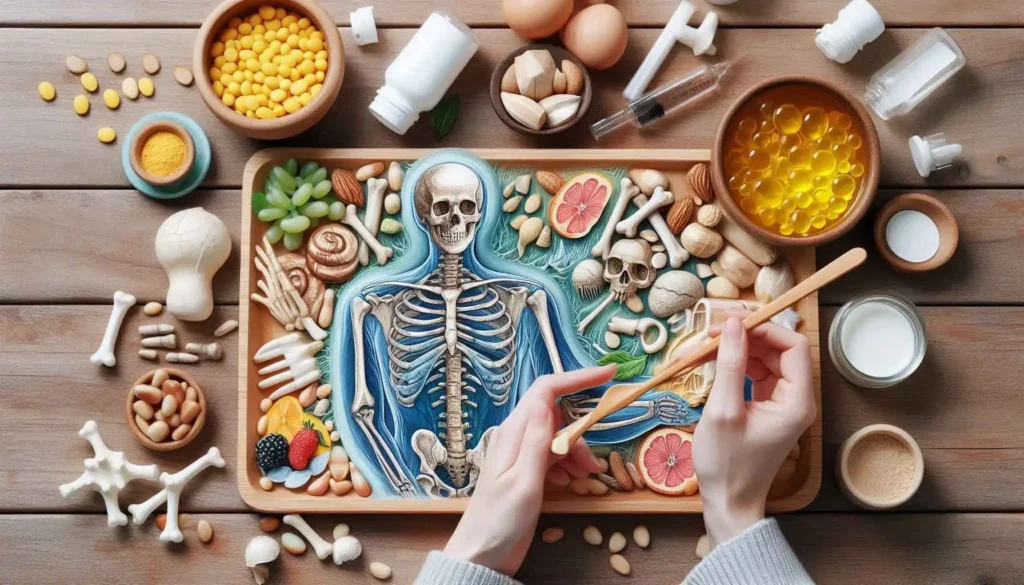
Foods That Strengthen Bones: A Science-Backed Guide to Improving Bone Health Naturally.
Bone health is a cornerstone of overall well-being, especially as we age. Strong bones support our body structure, protect vital organs, and enable mobility. However, factors like poor nutrition, sedentary lifestyles, and aging can lead to conditions such as osteoporosis, which affects millions worldwide. The good news? You can naturally bolster your bone health by incorporating nutrient-rich foods into your daily diet. Key nutrients like calcium, vitamin D, magnesium, vitamin K, and phosphorus play pivotal roles in bone density and strength.
In this article, we’ll explore the top 10 foods that promote bone health. These selections are based on their high content of bone-boosting nutrients and their ease of inclusion in everyday meals. Remember, while diet is crucial, it’s best combined with regular exercise, sunlight exposure, and medical advice for optimal results.
Why Diet Matters for Bone Health
Before diving into the list, let’s quickly cover the basics. Bones are living tissues that constantly regenerate, and they require a steady supply of minerals to stay strong. Calcium is the star player, forming the structural foundation of bones, while vitamin D aids in calcium absorption. Other nutrients like magnesium, vitamin K, and phosphorus work synergistically to prevent bone loss and reduce the risk of fractures.
The World Health Organization recommends a balanced diet rich in these nutrients to maintain bone density. By adding the following foods to your daily routine, you can make significant strides toward healthier bones without relying on supplements.
Top 10 Foods for Natural Bone Health
Here’s a curated list of the top 10 foods that can enhance your bone health. For each, I’ll highlight the key nutrients, health benefits, and simple ways to incorporate them into your meals.
1. Dairy Milk (or Fortified Plant-Based Alternatives)
- Key Nutrients: High in calcium (about 300 mg per cup) and vitamin D (in fortified versions).
- Bone Benefits: Calcium is essential for bone formation and maintenance, while vitamin D ensures it’s properly absorbed. Regular consumption can help prevent osteoporosis.
- How to Include in Your Diet: Start your day with a glass of milk in your coffee, cereal, or smoothies. If you’re lactose-intolerant, opt for fortified almond, soy, or oat milk. Aim for 1-2 servings daily.
- Tip: Choose low-fat versions to keep calories in check while maximizing nutrients.
2. Yogurt
- Key Nutrients: Packed with calcium (around 400 mg per cup), plus protein, vitamin D, and probiotics for gut health.
- Bone Benefits: The combination of calcium and protein supports bone remodeling, making yogurt a great choice for all ages. Probiotics may also indirectly aid nutrient absorption.
- How to Include in Your Diet: Enjoy it as a snack with fruits, mix it into salad dressings, or use it in marinades. Greek yogurt is an excellent option for higher protein content. Target 1 serving per day.
- Tip: Go for plain, unsweetened varieties to avoid added sugars.
3. Cheese
- Key Nutrients: Rich in calcium (about 200-300 mg per ounce), phosphorus, and vitamin K.
- Bone Benefits: Phosphorus works with calcium to build bone structure, and vitamin K helps regulate bone metabolism. It’s particularly useful for those who don’t consume much dairy otherwise.
- How to Include in Your Diet: Add cheese to sandwiches, salads, or omelets. A small portion can go a long way—try grating it over vegetables for extra flavor. Limit to 1-2 ounces daily to manage sodium intake.
- Tip: Aged cheeses like cheddar or Swiss offer more calcium per serving.
4. Fatty Fish (e.g., Salmon)
- Key Nutrients: Excellent source of vitamin D (up to 600 IU per 3-ounce serving) and omega-3 fatty acids, with some calcium from the bones in canned versions.
- Bone Benefits: Vitamin D enhances calcium absorption, reducing the risk of fractures. Omega-3s have anti-inflammatory effects that may protect bone health.
- How to Include in Your Diet: Grill or bake salmon for dinner twice a week. Canned sardines or mackerel are affordable alternatives. Aim for 2-3 servings of fatty fish per week.
- Tip: If you’re not a fan of fish, consider vitamin D-fortified options or talk to your doctor about supplements.
5. Dark Leafy Greens (e.g., Kale or Spinach)
- Key Nutrients: High in calcium (about 100-200 mg per cup), vitamin K, and magnesium.
- Bone Benefits: Vitamin K is vital for bone mineralization, and magnesium helps convert vitamin D into its active form. These greens are low-calorie powerhouses for bone density.
- How to Include in Your Diet: Add spinach or kale to salads, smoothies, stir-fries, or soups. Steam them as a side dish for meals. Incorporate at least one serving daily.
- Tip: Pair with a source of vitamin C, like lemon, to boost iron absorption, which indirectly supports bone health.
6. Broccoli
- Key Nutrients: Contains calcium (about 60 mg per cup), vitamin C, vitamin K, and magnesium.
- Bone Benefits: Vitamin C aids in collagen production, which is a key component of bone tissue. Its anti-inflammatory properties may also protect against bone loss.
- How to Include in Your Diet: Roast, steam, or stir-fry broccoli as a vegetable side. Add it to pasta, casseroles, or even pizza for a nutrient boost. Aim for 1-2 servings daily.
- Tip: Don’t overcook it—light steaming preserves more nutrients.





